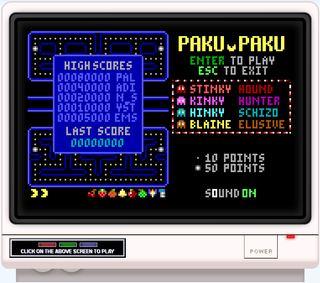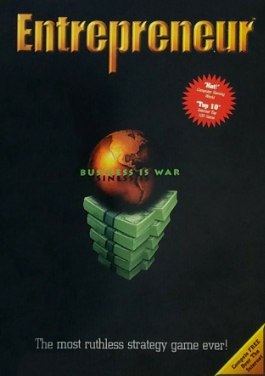Customer relationship management (CRM) is a process in which a business or another organization administers its interactions with customers, typically using data analysis to study large amounts of information.

Compaq Computer Corporation was an American information technology company founded in 1982 that developed, sold, and supported computers and related products and services. Compaq produced some of the first IBM PC compatible computers, being the second company after Columbia Data Products to legally reverse engineer the BIOS of the IBM Personal Computer. It rose to become the largest supplier of PC systems during the 1990s. The company was initially based in Harris County, Texas.
A management information system (MIS) is an information system used for decision-making, and for the coordination, control, analysis, and visualization of information in an organization. The study of the management information systems involves people, processes and technology in an organizational context. In other words, it serves, as the functions of controlling, planning, decision making in the management level setting.
Shoppers Drug Mart Inc. is a Canadian retail pharmacy chain based in Toronto, Ontario. It has more than 1,300 stores in ten provinces and two territories.

Gateway, Inc., previously Gateway 2000, Inc., was an American computer company originally based in Iowa and South Dakota. Founded by Ted Waitt and Mike Hammond in 1985, the company developed, manufactured, supported, and marketed a wide range of personal computers, computer monitors, servers, and computer accessories. At its peak in the year 2000, the company employed nearly 25,000 worldwide. Following a seven-year-long slump, punctuated by the acquisition of rival computer manufacturer eMachines in 2004 and massive consolidation of the company's various divisions in an attempt to curb losses and regain market share, Gateway was acquired by Taiwanese hardware and electronics corporation Acer in October 2007 for US$710 million.

Battlezone is a first-person shooter real-time strategy video game, developed and published by Activision. It was released for Microsoft Windows in 1998. Aside from the name and presence of tanks, this game bears little resemblance to the original arcade game of the same name. The game is a combination of a tank simulation game, a first-person shooter and a real-time strategy game.

Stardock Corporation is an American software development company founded in 1991 and incorporated in 1993 as Stardock Systems. Stardock initially developed for the OS/2 platform, but was forced to switch to Microsoft Windows due to the collapse of the OS/2 software market between 1997 and 1998. The company is best known for computer programs that allow a user to modify or extend a graphical user interface as well as personal computer games, particularly strategy games such as the Galactic Civilizations series, Sins of a Solar Empire: Rebellion, Elemental: Fallen Enchantress, and Ashes of the Singularity.

A personal computer game, also known as a computer game or abbreviated PC game, is a video game played on a personal computer (PC). The term PC game has been popularly used since the 1990s referring specifically to games on "Wintel" which has dominated the computer industry since.

Galactic Civilizations II: Dread Lords is a 4X turn-based strategy by Stardock for Microsoft Windows. It is the sequel to the 2003 game, Galactic Civilizations, and was released at retail and on Stardock's online subscription service, TotalGaming.net, on February 21, 2006. An expansion, Dark Avatar, was released in February 2007. A second expansion, Twilight of the Arnor, was released in April 2008.

Bradley R. Wardell is an American businessman, programmer, author and AI engineer. He is the founder, president, and chief executive officer of Stardock, a software development and computer games company.

Sins of a Solar Empire is a 2008 science fiction real-time strategy 4X video game developed by Ironclad Games and published by Stardock Entertainment for Microsoft Windows operating systems. It is a real-time strategy (RTS) game that incorporates some elements from 4X games; its makers describe it as "RT4X". Players are given control of a spacefaring empire in the distant future, and are tasked with conquering star systems using military, economic and diplomatic means.

Tom Clancy's ruthless.com is a turn-based strategy video game published in 1998 by Red Storm Entertainment. ruthless.com puts the player in the position of CEO of a new software company. The game features a campaign mode, six different scenarios of varying difficulty, and a multiplayer option. It later inspired a book of the same name in the Tom Clancy's Power Plays series.

Impulse was a digital distribution and multiplayer platform. Originally developed by Stardock to succeed Stardock Central, it was purchased by GameStop in March 2011, and was subsequently rebranded as GameStop PC Downloads, with the client being renamed GameStop App. The client was discontinued in April 2014.
GamersGate AB is a Sweden-based online video game store offering electronic strategy guides and games for Windows, macOS, and Linux via direct download. It is a competitor to online video game services such as Steam, GOG.com, and Direct2Drive.

Promotional merchandise are products branded with a logo or slogan and distributed at little or no cost to promote a brand, corporate identity, or event. Such products, which are often informally called promo products, swag, or freebies, are used in marketing and sales. Often they are of the tchotchke type. They are given away or sold at a loss to promote a company, corporate image, brand, or event. They are often distributed as handouts at trade shows, at conferences, on sales calls, and as bonus items in shipped orders. They are often used in guerrilla marketing campaigns. Ones for video games are often called feelies.
In the video game industry, digital distribution is the process of delivering video game content as digital information, without the exchange or purchase of new physical media such as ROM cartridges, magnetic storage, optical discs and flash memory cards. This process has existed since the early 1980s, but it was only with network advancements in bandwidth capabilities in the early 2000s that digital distribution became more prominent as a method of selling games. Currently, the process is dominated by online distribution over broadband Internet.
Markstrat is a multiplayer business market simulation game developed by Jean-Claude Larréché and Professor Hubert Gatignon in which players take control of a virtual corporation. Players make a number of decisions in marketing, finance, research and development, and other areas in order to achieve a better performance than competing players, who also take control of their own companies. After the game was developed it was distributed on an ad-hoc basis by the French business school INSEAD. Markstrat is played in over 500 academic institutions worldwide, including 8 of the top 10 international business schools.
Offworld Trading Company is a real-time strategy (RTS) video game developed by Mohawk Games and published by Stardock. The game was released for Microsoft Windows and OS X in April 2016.

Entrepreneur is a 1997 business simulation video game by Stardock Systems. A sequel, Business Tycoon, was released in 2000.

Star Control: Origins is an action-adventure game developed and published by Stardock Entertainment for Microsoft Windows, released September 20, 2018.












